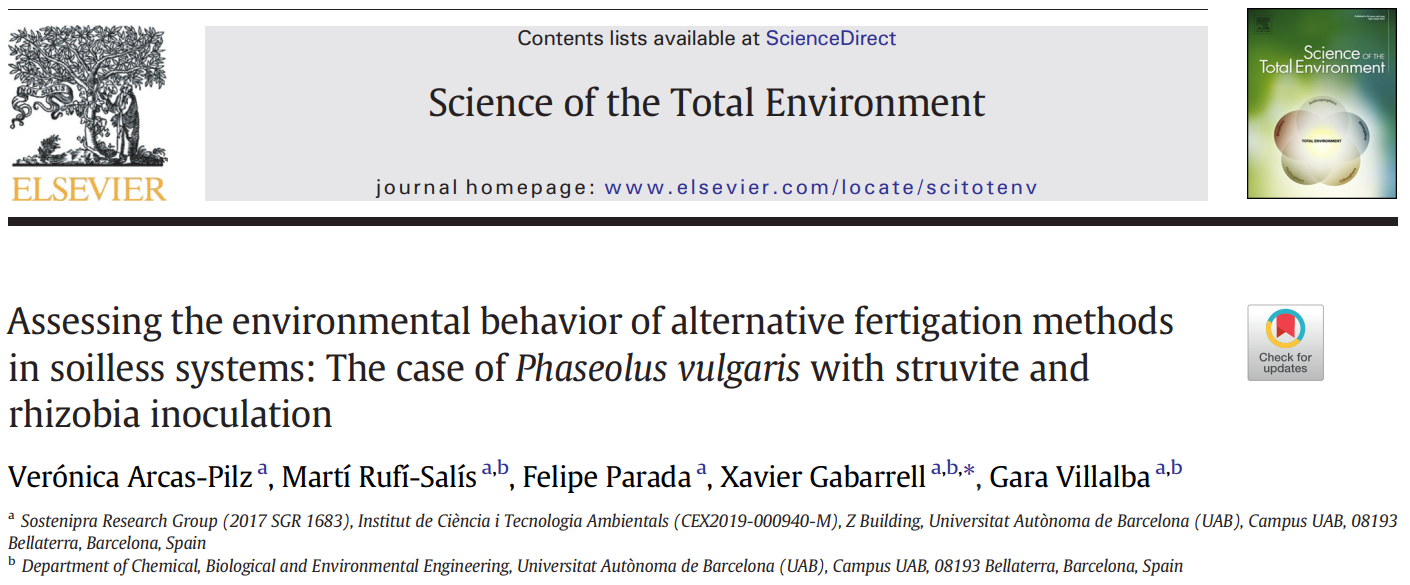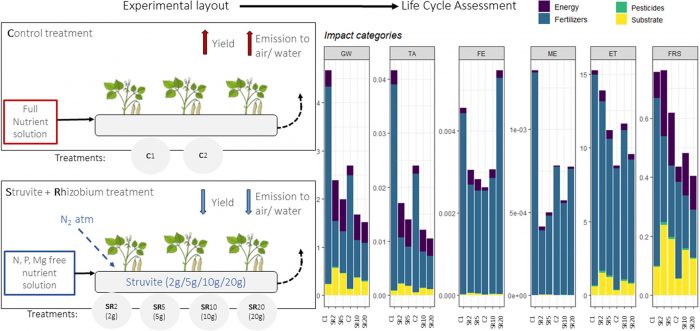Publication in Science of the Total Environment
2 February 2021
See full article/Veure l’article complet: https://doi.org/10.1016/j.scitotenv.2020.144744
English:
Urban agriculture, while being a promising solution to increase food sovereignty in cities, can lead to an unprecedented discharge of nutrient and fertilizer-related emissions into the urban environment. Especially relevant are nitrogen (N) and phosphorus (P), due to their contribution to marine and freshwater eutrophication. Therefore, alternative methods of fertilization need to be put into practice to avoid such impacts to the surrounding environment. Struvite, has been studied as a potential slow releasing fertilizer due to its high P content, while the bacteria rhizobium has been used to fix N directly from the atmosphere. Legumes, like the common bean are N-demanding crops capable of symbiosis with the bacteria rhizobium and have previously shown positive responses to fertilization with struvite. This study aims to analyze the environmental performance of plant production in hydroponic systems combining rhizobium inoculation and struvite (2 g, 5 g, 10 g, 20 g) irrigated with a N and P deficient nutrient solution, using life cycle analysis (LCA). The nutrient content of in- and out-going irrigation was analyzed as well as in plants and beans. The functional unit for the LCA was 1 kg of fresh beans. The results obtained indicate a yield reduction of 60% to 50% in comparison to the control which was irrigated with a full nutrient solution. The impacts from operational stage are less in all impact categories, where most significant reductions up to 69% and 59% are seen in marine-eutrophication and global warming respectively. Although the infrastructure does not change between treatments, its impacts increase due to the lower yields. We determine that below a 10% of the control yield, the alternative systems have more impact than the use of conventional mineral fertilizers in almost all impact categories, thus pointing to the importance of infrastructure to truly reduce environmental impacts for urban agriculture.
Català:
L’agricultura urbana, tot i ser una solució prometedora per augmentar la sobirania alimentària a les ciutats, pot conduir a una descàrrega sense precedents d’emissions relacionades amb l’ús de nutrients i fertilitzants en l’entorn urbà. A causa de la seva contribució a l’eutrofització marina i d’aigua dolça, són especialment rellevants el nitrogen (N) i el fòsfor (P). Per tant, s’han de posar en pràctica mètodes alternatius de fertilització per evitar aquests impactes en l’entorn circumdant. S’ha estudiat l’Struvite com un possible fertilitzant d’alliberament lent a causa del seu alt contingut en P, mentre que el bacteri rhizobium s’ha utilitzat per fixar N directament de l’atmosfera. Els llegums, com la mongeta comuna, són cultius exigents en N però capaços de la simbiosi amb el bacteri rizobi i prèviament han mostrat respostes positives a la fertilització amb struvite. Aquest estudi té com a objectiu analitzar el rendiment ambiental de la producció de plantes en sistemes hidropònics, combinant inoculació i struvite de rizobi (2 g, 5 g, 10 g, 20 g) regats amb una solució nutritiva deficient en N i P, mitjançant anàlisi del cicle de vida (LCA). S’ha analitzat el contingut nutritiu del reg entrant i sortint en mongetes. La unitat funcional de la LCA era d’1 kg de mongetes fresques. Els resultats obtinguts indiquen una reducció de rendiment del 60% al 50% en comparació amb el cas de control, el qual es va regar amb una solució completa nutricionalment. Els impactes de l’etapa operativa són menors en totes les categories, on les reduccions més significatives que arriben fins al 69% i el 59% es veuen en l’eutrofització marina i l’escalfament global, respectivament. Tot i que la infraestructura no canvia entre tractaments, els seus impactes augmenten a causa dels menors rendiments. Hem determinat que si baixem per sota d’un 10% del rendiment en comparació al cas de control, els sistemes alternatius tenen més impacte que l’ús de fertilitzants minerals convencionals en gairebé totes les categories d’impacte, apuntant així a la importància de les infraestructures per reduir veritablement els impactes ambientals per a l’agricultura urbana.
 Graphical abstract
Graphical abstract